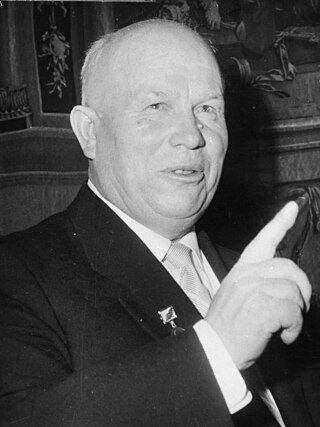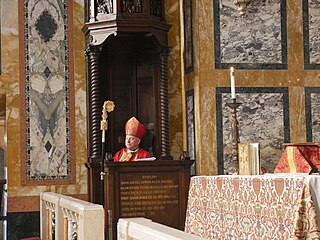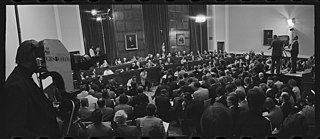
Richard Milhous Nixon was the 37th president of the United States, serving from 1969 to 1974. A member of the Republican Party, he previously served as a representative and senator from California and as the 36th vice president from 1953 to 1961 under President Dwight D. Eisenhower. His presidency saw the reduction of U.S. involvement in the Vietnam War, détente with the Soviet Union and China, the Apollo 11 Moon landing, and the establishment of the Environmental Protection Agency and Occupational Safety and Health Administration. Nixon's second term ended early when he became the only U.S. president to resign from office, as a result of the Watergate scandal.

Nikita Sergeyevich Khrushchev was First Secretary of the Communist Party of the Soviet Union from 1953 to 1964, and Chairman of the Council of Ministers (premier) from 1958 to 1964. During his rule, Khrushchev stunned the communist world with his denunciation of his predecessor Joseph Stalin and embarked on a policy of de-Stalinization with his key ally Anastas Mikoyan. He sponsored the early Soviet space program and enacted reforms in domestic policy. After some false starts, and a narrowly avoided nuclear war over Cuba, he conducted successful negotiations with the United States to reduce Cold War tensions. In 1964, the Kremlin circle stripped him of power, replacing him with Leonid Brezhnev as First Secretary and Alexei Kosygin as Premier.

The Watergate scandal was a major political controversy in the United States during the presidency of Richard Nixon from 1972 to 1974, ultimately resulting in Nixon's resignation. The name originated from attempts by the Nixon administration to conceal its involvement in the June 17, 1972 break-in at the Democratic National Committee headquarters located in the Watergate Office Building in Washington, D.C.

Jeb Stuart Magruder was an American businessman and high-level political operative in the Republican Party who served time in prison for his role in the Watergate scandal.

John Daniel Ehrlichman was an American political aide who served as White House Counsel and Assistant to the President for Domestic Affairs under President Richard Nixon. Ehrlichman was an important influence on Nixon's domestic policy, coaching him on issues and enlisting his support for environmental initiatives.

Freddie Dalton Thompson was an American politician, attorney, lobbyist, columnist, actor, and radio personality. A member of the Republican Party, he served as a United States Senator from Tennessee from 1994 to 2003. He was an unsuccessful candidate in the Republican Party presidential primaries for the 2008 United States presidential election.

John Wesley Dean III is a disbarred American attorney who served as White House Counsel for U.S. President Richard Nixon from July 1970 until April 1973. Dean is known for his role in the cover-up of the Watergate scandal and his subsequent testimony to Congress as a witness. His guilty plea to a single felony in exchange for becoming a key witness for the prosecution ultimately resulted in a reduced sentence, which he served at Fort Holabird outside Baltimore, Maryland. After his plea, he was disbarred.

Rose Mary Woods was Richard Nixon's secretary from his days in Congress in 1951 through the end of his political career. Before H. R. Haldeman and John Ehrlichman became the operators of Nixon's presidential campaign, Woods was Nixon's gatekeeper.

The Richard Nixon Presidential Library and Museum is the presidential library and burial site of Richard Milhous Nixon, the 37th president of the United States (1969–1974), and his wife Pat Nixon.
Audio recordings of conversations between U.S. President Richard Nixon and Nixon administration officials, Nixon family members, and White House staff surfaced during the Watergate scandal in 1973 and 1974, leading to Nixon's resignation.
This bibliography of Richard Nixon includes publications by Richard Nixon, the 37th president of the United States, and books and scholarly articles about him and his policies.
The Duke of Westminster's Medal for Military Literature was awarded by the Royal United Services Institute for Defence and Security Studies,, Whitehall, London. Awarded annually from 1997 to 2016, the Medal was given to honour a living author who has published a notable original contribution to the fields of defences studies and international security affairs. This award has been superseded by the Duke of Wellington Medal for Military History as of 2018.

David Todd Christofferson is an American religious leader and former lawyer who serves as a member of the Quorum of the Twelve Apostles of the Church of Jesus Christ of Latter-day Saints. He has been a general authority of the church since 1993. Currently, he is the eighth most senior apostle in the church.

John Harvey Taylor is the Bishop of Los Angeles in the Diocese of Los Angeles of the Episcopal Church.

Havana Harbor is the port of Havana, the capital of Cuba, and it is the main port in Cuba. Other port cities in Cuba include Cienfuegos, Matanzas, Manzanillo, and Santiago de Cuba.
The Roswell and Elizabeth Garst Farmstead Historic District is a farm in Guthrie County, Iowa, United States, near the city of Coon Rapids. It is significant as the home of farmer and hybrid corn populizer Roswell Garst. During the 1930s and 1940s, Garst played an active role in the conversion of old-style family farms to modern agribusiness. He was a key marketer of hybrid seed corn, which greatly increased corn yields per acre. Further, he espoused the use of nitrogen and other chemical fertilizers to renew soil so that fields need not be left fallow in order for the soil to replenish, allowing farmers to grow more acres of corn. Additionally, he embraced the use of cellulose from corncobs left after processing seed corn as cattle feed.

The Richard Nixon Foundation is a not-for-profit organization based at the Richard Nixon Presidential Library and Museum in Yorba Linda, California. It was founded in August 1983 by Richard Nixon, 37th president of the United States, and served as the governing body of the Nixon Library for nearly twenty years. Today it operates the Nixon Library in conjunction with the National Archives and Records Administration, which is an entity of the federal government of the United States, in addition to undertaking charitable and education-based activities.

Georgi Nikitovich Bolshakov was a Soviet GRU officer under journalist cover who was posted to Washington, D.C., twice, most significantly in the early 1960s. In this capacity, he played a major role in diplomacy between the United States and the Soviet Union during the beginning of the John F. Kennedy administration. President Kennedy’s brother, Attorney General Robert F. Kennedy, secretly met with Bolshakov on numerous occasions in 1961 in order to gain more information about Soviet intentions and convey messages from the administration to the top Soviet leadership, including Premier Nikita Khrushchev.

The impeachment process against Richard Nixon was initiated by the United States House of Representatives on October 30, 1973, during the course of the Watergate scandal, when multiple resolutions calling for the impeachment of President Richard Nixon were introduced immediately following the series of high-level resignations and firings widely called the "Saturday Night Massacre". The House Committee on the Judiciary soon began an official investigation of the president's role in Watergate, and, in May 1974, commenced formal hearings on whether sufficient grounds existed to impeach Nixon of high crimes and misdemeanors under Article II, Section 4, of the United States Constitution. This investigation was undertaken one year after the United States Senate established the Select Committee on Presidential Campaign Activities to investigate the break-in at the Democratic National Committee headquarters at the Watergate office complex during the 1972 presidential election, and the Republican Nixon administration's attempted cover-up of its involvement; during those hearings the scope of the scandal became apparent and the existence of the Nixon White House tapes was revealed.
This bibliography of John F. Kennedy is a list of published works about John F. Kennedy, the 35th president of the United States.















